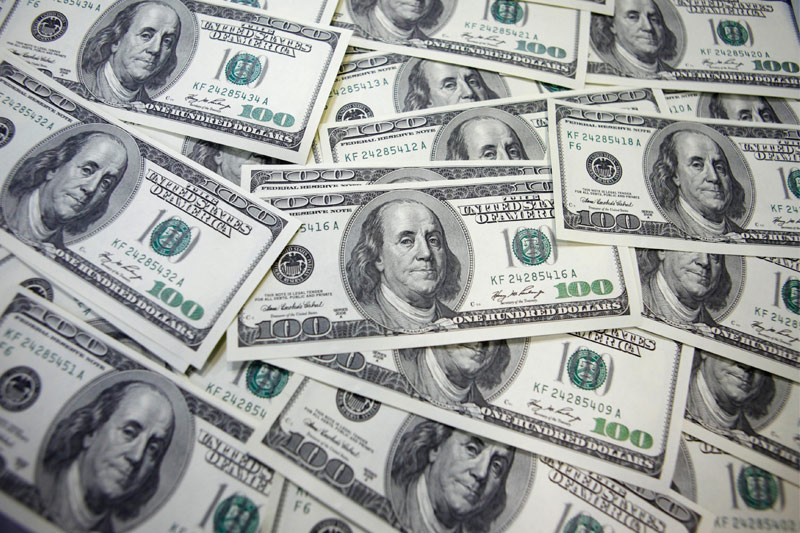Investing.com - The U.S. dollar was broadly higher against its major counterparts on Tuesday, as markets were jittery after weekend votes in Greece and France sparked fresh concerns over the handling of the euro zone’s financial woes.
During European morning trade, the dollar was higher against the euro, with EUR/USD falling 0.22% to hit 1.3022.
Markets were watching developments in Greece as political leaders continued to hold cross party talks after the country’ largest party, New Democracy, was unable to reach an agreement to form a government on Monday.
The uncertainty fuelled fears that Greece will not have a government in place in time to secure its next tranche of international aid next month, as new elections look increasingly likely.
Investors were also jittery amid concerns over new French president-elect, Socialist Francois Hollande who has said he wants to renegotiate the euro zone’s fiscal pact in order to stimulate growth in the region.
The greenback was also higher against the pound, with GBP/USD declining 0.30% to hit 1.6141.
Industry data showed earlier that house price balance in the U.K. fell more-than-expected in April, declining 19% after an 11% fall the previous month.
Analysts had expected house price balance to fall 10% in April.
Elsewhere, the greenback was steady against the yen and higher against the Swiss franc, with USD/JPY easing 0.07% to hit 79.83 and USD/CHF adding 0.21% to hit 0.9225.
The greenback was higher against its Canadian, Australian and New Zealand counterparts, with USD/CAD rising 0.36% to hit 0.9967, AUD/USD dropping 0.47% to hit 1.0150 and NZD/USD retreating 0.52% to hit 0.7905.
The Australian dollar came under pressure after official data showed that Australia’s trade deficit more than doubled in March, widening to AUD1.59 billion from a deficit of AUD0.75 billion the previous month, as commodity exports fell.
Analysts had expected Australia’s trade deficit to widen to AUD1.38 billion in March.
The dollar index, which tracks the performance of the greenback versus a basket of six other major currencies, was up 0.20%, at 79.86.
Later in the day, Germany was to release official data on industrial production, while European Central Bank President Mario Draghi was due to speak in Frankfurt.
During European morning trade, the dollar was higher against the euro, with EUR/USD falling 0.22% to hit 1.3022.
Markets were watching developments in Greece as political leaders continued to hold cross party talks after the country’ largest party, New Democracy, was unable to reach an agreement to form a government on Monday.
The uncertainty fuelled fears that Greece will not have a government in place in time to secure its next tranche of international aid next month, as new elections look increasingly likely.
Investors were also jittery amid concerns over new French president-elect, Socialist Francois Hollande who has said he wants to renegotiate the euro zone’s fiscal pact in order to stimulate growth in the region.
The greenback was also higher against the pound, with GBP/USD declining 0.30% to hit 1.6141.
Industry data showed earlier that house price balance in the U.K. fell more-than-expected in April, declining 19% after an 11% fall the previous month.
Analysts had expected house price balance to fall 10% in April.
Elsewhere, the greenback was steady against the yen and higher against the Swiss franc, with USD/JPY easing 0.07% to hit 79.83 and USD/CHF adding 0.21% to hit 0.9225.
The greenback was higher against its Canadian, Australian and New Zealand counterparts, with USD/CAD rising 0.36% to hit 0.9967, AUD/USD dropping 0.47% to hit 1.0150 and NZD/USD retreating 0.52% to hit 0.7905.
The Australian dollar came under pressure after official data showed that Australia’s trade deficit more than doubled in March, widening to AUD1.59 billion from a deficit of AUD0.75 billion the previous month, as commodity exports fell.
Analysts had expected Australia’s trade deficit to widen to AUD1.38 billion in March.
The dollar index, which tracks the performance of the greenback versus a basket of six other major currencies, was up 0.20%, at 79.86.
Later in the day, Germany was to release official data on industrial production, while European Central Bank President Mario Draghi was due to speak in Frankfurt.
